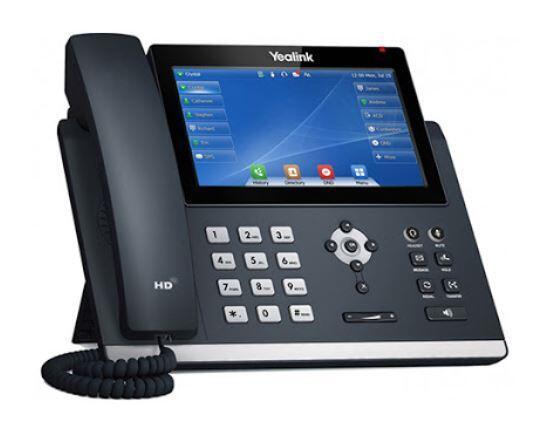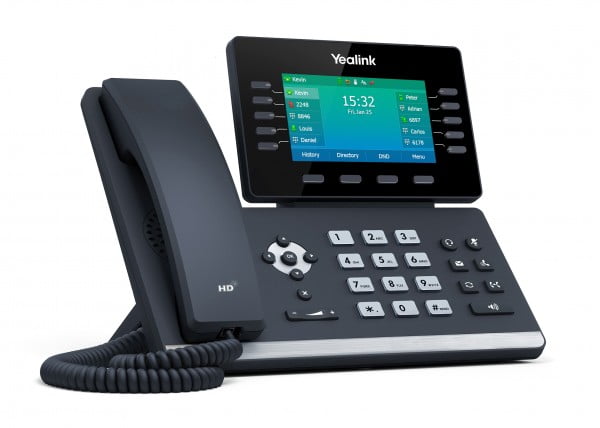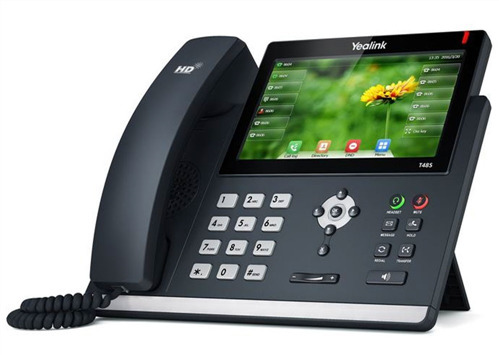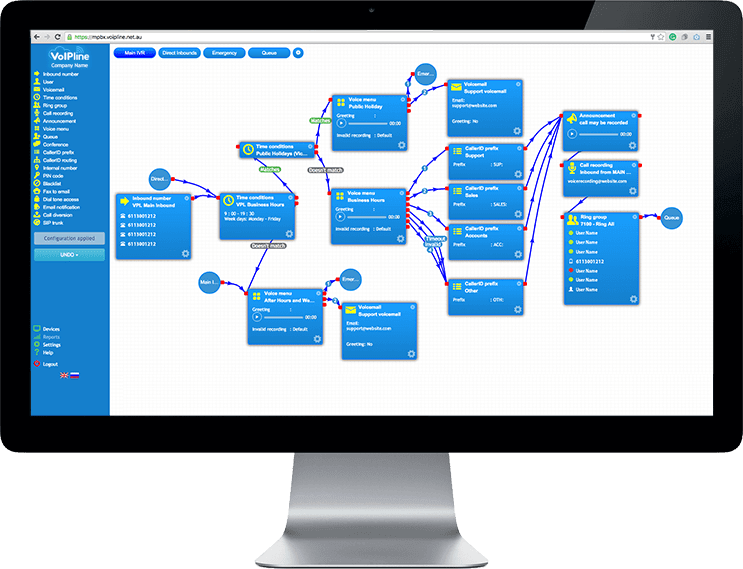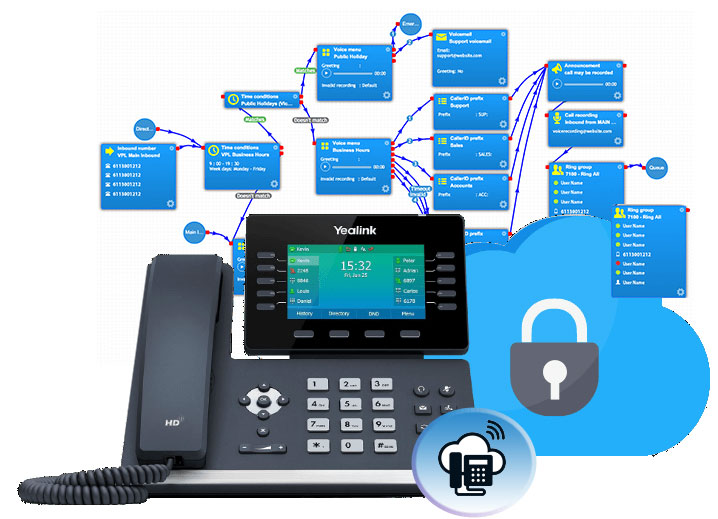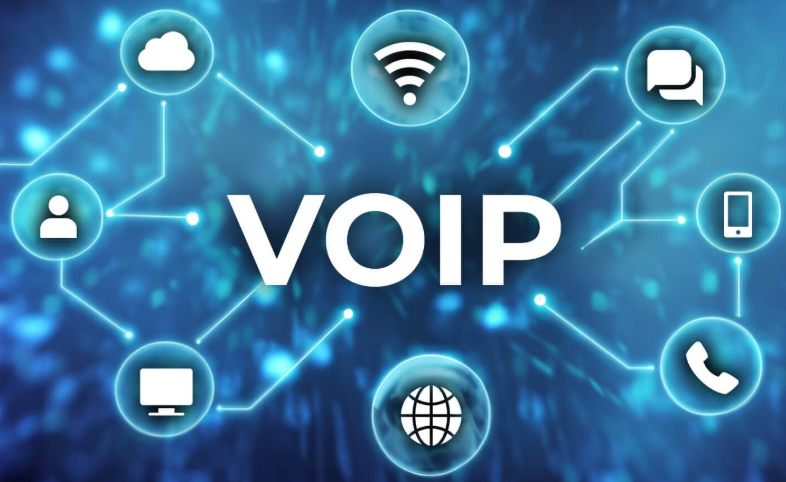Queensland Businesses Saving on Communication Costs while Adding Capabilities.
Request a call back for a free consultation.
Direct access to our Voice and Business Automation Engineer.
He will be conducting your initial phone conversation.
To arrange a suitable time, please complete the form.
Easy PBX call flows
The PBX employs a user-friendly block-based diagram interface that allows users to effortlessly drag and drop new elements and establish connections within the visual call flow diagram. Modifications take effect immediately with a single button click, all without disrupting ongoing active calls.
Time based call routing
Calls can be rerouted to different destinations depending on various time parameters, such as the time of day, days of the week, month, or even the year. For instance, calls can be directed straight to voicemail during non-business hours and on public holidays. Moreover, the system can accommodate multiple time zones, ensuring that inbound calls are routed to the appropriate open office based on the time zone in question.
Automated voice menu
The interactive voice response (IVR) menu offers callers a welcoming message and a range of dynamic choices, enabling them to be efficiently guided to the relevant department, individual, or information. For instance, press 1 for sales, 2 for support, and so forth.
Lease phone systems financed from total order value $2,000
Thanks to our finance partner, qualifying customers of ours can turn their VoIP capability acquisition into an easy to manage monthly payment. Please talk to us about available inhouse financing options. Restrictions and limitations apply in accordance with our finance provider rules.
Cost Savings: VoIP can significantly reduce your business’s phone expenses. Traditional landline systems are often more expensive due to long-distance charges and per-minute billing. VoIP, on the other hand, typically offers flat-rate pricing for local and international calls, leading to substantial cost savings.
Scalability: VoIP systems are highly scalable. You can easily add or remove phone lines as your business grows or downsizes, ensuring you pay only for what you need. This scalability is particularly beneficial for startups and small businesses.
Flexibility: VoIP systems provide flexibility in terms of where and how calls are made. Employees can use their smartphones, laptops, or desktops to make and receive calls from anywhere with an internet connection. This enables remote work, which is especially valuable in today’s business landscape.
Advanced Features: VoIP offers a wide range of advanced features that enhance business communication. These features include call forwarding, voicemail-to-email transcription, video conferencing, call recording, and auto-attendant services. Such tools improve efficiency and customer service.
Integration: VoIP can integrate seamlessly with other business tools and applications, such as CRM systems and email clients. This integration streamlines workflows, making it easier for employees to access information and communicate effectively.
Enhanced Productivity: VoIP services often come with collaboration tools like video conferencing and screen sharing. These tools promote teamwork, allowing employees to collaborate more effectively, whether they’re in the same office or working remotely.
Enhanced Productivity: VoIP services often come with collaboration tools like video conferencing and screen sharing. These tools promote teamwork, allowing employees to collaborate more effectively, whether they’re in the same office or working remotely.
Mobility: VoIP enables mobile communication, giving employees the ability to stay connected while on the move. This can be especially beneficial for sales teams, field workers, and businesses with remote staff.
Reliability: VoIP providers typically offer high-quality service with minimal downtime. Additionally, many VoIP systems have backup and failover options to ensure continuous communication in case of network issues.
Global Reach: VoIP allows businesses to establish virtual phone numbers in different locations, even in countries where they don’t have a physical presence. This can enhance your global reach and make it easier for international customers to reach you.
Analytics and Reporting: VoIP systems provide detailed call analytics and reporting, helping businesses gain insights into call patterns, customer interactions, and employee performance. This data can be used to make informed decisions and improve customer service.
Environmental Benefits: VoIP reduces the need for traditional landline infrastructure, which can be more environmentally friendly. This aligns with the growing trend of businesses aiming for sustainability and reducing their carbon footprint.
Advanced call queuing
When you cannot answer a call right away or if the number of incoming calls surpasses the number of available agents, you have the option to implement a call queue. Calls can be held in a queue with your personalized on-hold music or promotional announcements. You can configure a variety of advanced settings to align with your business requirements, including maximum wait times, exit conditions, post-call wrap-up periods, a selection of devices or users to ring, customized reporting models, and more. Integrating a queue into your call flow not only reduces the likelihood of missed calls but also provides you with valuable call statistics that were previously unavailable!
Set up a conference call
Enable an unrestricted quantity of incoming callers to access your conference room and engage in discussions, regardless of their geographical location. Furnish callers with a dedicated virtual number or dial an internal number from your VoIP phone and subsequently transfer the call to the “Virtual conference room.” Enhance security by adding a PIN to the call, ensuring that only authorized participants can utilize the conference facility. After the group call concludes, record the conference and distribute it to all participants via email.
Dial tone access
Grant your employees the choice to dial a dedicated number from an external phone, input a secure PIN, and make outbound calls through your hosted office system, replicating the experience of calling from the office. This feature is especially beneficial for your mobile workforce, who may not consistently have internet access for making and receiving calls.
Very Happy! Highly recommend Lee and the team.

We were under time constraints for our voice migration and the project had to be rolled out yesterday. Thanks to Lee and his team all went to plan. We could not be happier. The flexibility we have gained thanks to the soft PBX is phenomenal - loving it.
Pascal
Delivering quality VoIP solutions to our Queensland customers
Servicing Queensland. Local to Hervey Bay, Bundaberg, Maryborough.
Choosing a Hervey Bay local VoIP provider offers numerous advantages that extend beyond the realm of communication technology. The ability to work together on the ground, personalized service, faster response times, community engagement, on-site support, and compliance expertise all contribute to a more effective and tailored VoIP solution for your business. If you want to get to know us and find out what VoIP can do to enhance your business operations, secure a free consultation. Yes we do rollout on the ground projects across Brisbane, Gold Coast and all of Queensland.
Voice over Internet Protocol (VoIP) is a powerful tool for modern businesses, providing affordable, efficient, and scalable communication solutions. However, its growing …
As businesses and individuals continue to seek more efficient and cost-effective ways to communicate, Voice over Internet Protocol (VOIP) technology has emerged …
Modern VoIP (Voice over Internet Protocol) systems have redefined business communication. With their cost-saving potential and advanced features, VoIP has become indispensable …
VoIP Archives
Is VoIP a cloud service?
VoIP (Voice over Internet Protocol) itself is not inherently a cloud service, but it can be delivered as a cloud-based service. VoIP refers to the technology that allows voice communication and multimedia sessions to be transmitted over the internet using IP (Internet Protocol) networks. It can be implemented in various ways:
- On-Premises VoIP: In this scenario, a business or organization sets up and manages its own VoIP infrastructure using on-premises hardware and software. It doesn’t rely on cloud services and is typically managed locally.
- Hosted VoIP: Hosted VoIP, also known as cloud VoIP, is a cloud-based service where a third-party provider hosts and manages the VoIP infrastructure on behalf of the organization. Users access the VoIP services over the internet, and the provider is responsible for maintenance, updates, and ensuring the service’s availability.
In the context of hosted or cloud VoIP services, VoIP technology is delivered as part of a broader cloud communication solution. These services leverage cloud infrastructure to provide voice communication capabilities, often with additional features and services, such as video conferencing, instant messaging, and collaboration tools.
So, while VoIP technology itself is not inherently cloud-based, it can be delivered as a cloud service when organizations opt for hosted or cloud-based VoIP solutions. This approach offers advantages like scalability, cost-effectiveness, and flexibility, as mentioned in the previous response.
What is cloud VoIP?
Cloud VoIP, also known as Cloud Voice over Internet Protocol, is a technology that enables voice communication and multimedia sessions over the internet through cloud-based servers and infrastructure. Instead of relying on traditional phone lines, Cloud VoIP utilizes the internet to transmit voice data in the form of digital packets. Here are some key aspects of Cloud VoIP:
- Cloud-Based Infrastructure: Cloud VoIP services are hosted on remote servers maintained by service providers. Users do not need to invest in on-premises hardware or infrastructure. Instead, they access VoIP services through an internet connection.
- Scalability: Cloud VoIP services are highly scalable, allowing businesses to easily add or remove phone lines and features as needed. This flexibility is particularly beneficial for businesses with fluctuating communication needs.
- Cost-Efficiency: Cloud VoIP often offers cost savings compared to traditional phone systems. There are typically lower upfront costs, reduced maintenance expenses, and competitive pricing plans.
- Advanced Features: Cloud VoIP services often include a range of advanced features such as call forwarding, voicemail-to-email, video conferencing, auto-attendants, and integration with other business applications like CRM systems.
- Geographical Flexibility: Users can make and receive calls from anywhere with an internet connection, making it suitable for remote work and distributed teams. Geographic boundaries are virtually eliminated.
- Reliability and Redundancy: Reputable cloud VoIP providers offer redundancy and backup solutions to ensure uninterrupted service even in the event of server failures or network issues.
- Quality of Service (QoS): To maintain call quality, many providers prioritize voice traffic, ensuring low latency and minimal packet loss during calls.
- Integration: Cloud VoIP systems can often integrate with other communication tools and software, enhancing productivity and workflow efficiency.
- Easy Management: Users can typically manage their cloud VoIP services through web-based interfaces, making it easy to configure settings and access call data and analytics.
- Security: Providers implement security measures to protect voice data and prevent unauthorized access, but it’s important for users to also take precautions, such as using strong passwords and encryption.
Cloud VoIP has become increasingly popular for businesses of all sizes due to its flexibility, cost-effectiveness, and the ability to provide feature-rich communication solutions. It is often seen as a modern alternative to traditional landline and on-premises phone systems.
What is the difference between VoIP and cloud?
VoIP (Voice over Internet Protocol) and “the cloud” are related but distinct concepts in the realm of modern telecommunications and technology. Here are the key differences between the two:
- Technology vs. Infrastructure:
- VoIP: VoIP is a technology that allows voice and multimedia communication to be transmitted over the internet using IP (Internet Protocol) networks. It is a method of delivering voice communication.
- Cloud: “The cloud” refers to a broader concept that encompasses various services, applications, and infrastructure that are hosted and delivered over the internet. Cloud computing includes services like storage, computing power, software, and communication tools, which can include VoIP.
- Scope:
- VoIP: VoIP specifically deals with voice and multimedia communication. It focuses on enabling phone calls, video conferencing, and related services over the internet.
- Cloud: The cloud encompasses a wide range of services and resources, including computing power, storage, software applications, databases, and more. While VoIP can be part of cloud-based services, the cloud is a broader concept that extends beyond communication.
- Deployment:
- VoIP: VoIP can be deployed both on-premises (locally managed by an organization) and in the cloud (hosted and managed by a third-party provider). Organizations have the flexibility to choose their VoIP deployment method.
- Cloud: Cloud services are, by definition, hosted and managed by external providers. Users access cloud services over the internet, and these services are typically maintained and operated by third-party vendors.
- Use Cases:
- VoIP: VoIP is primarily used for voice communication, video conferencing, and related telecommunication needs. It is commonly employed for phone systems, business communication, and remote collaboration.
- Cloud: Cloud services can be used for a wide range of purposes, including data storage, software development, hosting websites, running applications, big data analytics, and much more. Communication services like VoIP can be hosted in the cloud as part of a broader cloud-based solution.
In summary, VoIP is a technology focused on voice and multimedia communication, while “the cloud” is a broader concept encompassing a wide range of services and resources delivered over the internet. VoIP can be part of cloud-based services when it is hosted and delivered through cloud infrastructure.
Is cloud PBX the same as VoIP?
Cloud PBX (Private Branch Exchange) and VoIP (Voice over Internet Protocol) are related concepts, but they are not the same. They work together in modern telephony systems, but they serve different purposes:
- Cloud PBX (Private Branch Exchange):
- A Cloud PBX is a telephone switching system that is hosted in the cloud by a third-party provider.
- It is responsible for call routing, call forwarding, voicemail, and other call management features within an organization.
- Cloud PBX systems are often used in business environments to manage internal and external calls and are typically part of a broader unified communications solution.
- Users can access Cloud PBX services through VoIP, traditional phone lines, or even mobile devices, depending on the configuration.
- VoIP (Voice over Internet Protocol):
- VoIP is a technology that allows voice and multimedia communication to be transmitted over the internet or IP networks.
- It is the method used to transmit voice data as digital packets over the internet.
- VoIP can be used with various devices and software applications, such as IP phones, softphones (software-based phones), video conferencing systems, and more.
- While VoIP is a fundamental technology for transmitting voice over the internet, it can be used in conjunction with various call management systems, including traditional PBX systems and Cloud PBX.
In summary, Cloud PBX is a service that provides call management features, often hosted in the cloud, while VoIP is the underlying technology used to transmit voice over IP networks. Cloud PBX systems often leverage VoIP technology to enable communication within an organization. VoIP is a technology, while Cloud PBX is a service that utilizes VoIP to manage calls and communication.


